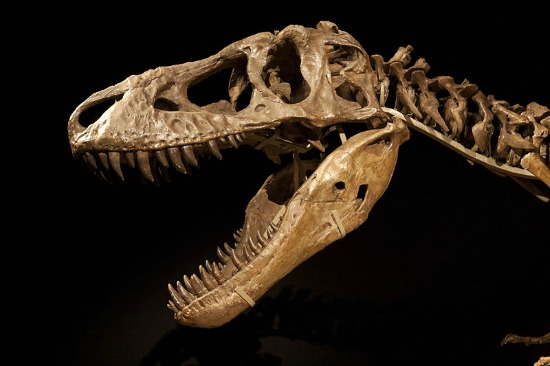Tarbosaurus the Tip of the Black Market Iceberg
Earlier this week, federal officials arrested a man charged with selling numerous illegal dinosaur specimens
![]()

The skull of a mounted Tarbosaurus (not the specimen seized by authorities). Photo by Jordi Payà, from Wikipedia.
For the past six months, the fate of a million-dollar tyrannosaur has been in limbo. A composite Tarbosaurus skeleton has been awaiting the outcome of an ongoing court trial–will the dinosaur bones go home to Mongolia or wind up in the hands of the private collector who successfully bid for the dinosaur?
At every step, the case has become more complex. What was thought to be a single, mostly complete dinosaur turned out to be a jumble of many, and the documents used to import the fossils to the United States hint that these dinosaurs were indeed smuggled out of Mongolia. Earlier this week, federal officials arrested the man who imported and assembled the contentious skeleton.
According to reports by the Guardian and LiveScience, commercial fossil dealer Eric Prokopi was involved in many shady schemes. In addition to the disputed Tarbosaurus, documents filed by the U.S. Attorney’s Office charge Prokopi with trying to smuggle a specimen of the small, feathery dinosaur Microraptor out of China, illegally selling an illicit specimen of the hadrosaur Saurolophus to auction house I.M. Chait and the sale of two other dinosaurs illegally collected from Mongolia. The charges against Prokopi include conspiracy to smuggle illegal goods, making false statements and interstate sale and receipt of stolen goods.
From the very beginning, the Mongolian Government, paleontologists and U.S. officials have been skeptical about how a “mostly complete” Tarbosaurus–a tyrannosaur primarily found in Mongolia–could have been secretly exported from a country with a strict commitment to responsible collection and research. But experts also knew that this dinosaur was only one visible point of a massive black market that continues to rob nations of their natural history heritage. Indeed, the new charges assert that the Tarbosaurus was not the first illegal specimen Prokopi tried to sell, and the Florida fossil dealer is hardly unique. How many dinosaurs have been lost in private collections because of unscrupulous commercial paleontologists? With any luck, though, this case may help the United States tighten the laws surrounding fossil sales. We should not only strive to protect fossils at home but to work with other countries to preserve the global story of dinosaurs.
For more on the Tarbosaurus case, see my previous posts on the controversy. And for Tarbosaurus science, check out these articles.
/https://tf-cmsv2-smithsonianmag-media.s3.amazonaws.com/accounts/headshot/RileyBlack.png)
/https://tf-cmsv2-smithsonianmag-media.s3.amazonaws.com/accounts/headshot/RileyBlack.png)